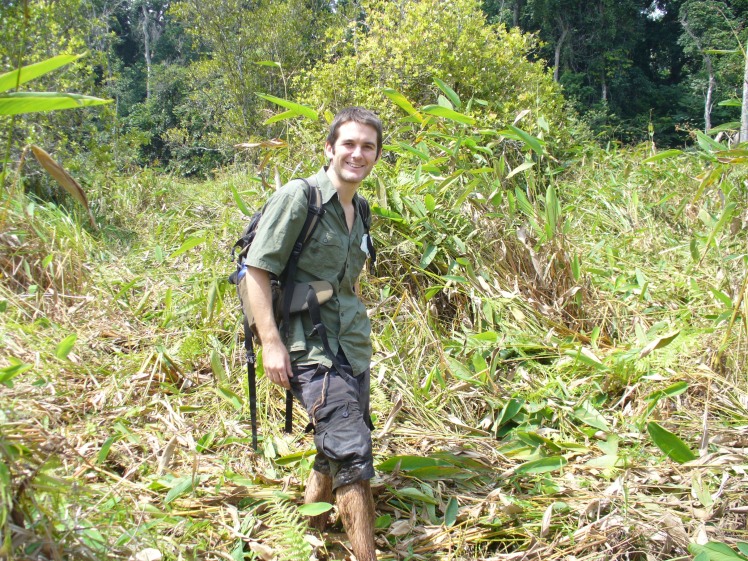Every child has a dream. Some want to be famous, some want to help others and some just want to go to Disney World. Ed Wright’s was to be able to understand animal behaviour. Now, thanks partly to his BSc in Zoology with a Modern Language at the University of Manchester, Ed is getting to live that dream. From Gabon to Leipzig, and elephants to meerkats, Ed has observed a wide array of animals in a variety of different conditions and locations. Here, he discusses the path he has taken and the places he has visited. Prepare to get jealous!

The dream
Since I was a young boy, I always wanted to understand why animals do what they do, so the decision to study zoology was an easy one. I ended up combining zoology with French, which was really useful later on – plus, I got to spend a year in France gaining work experience.
Meerkats
After graduating with a BSc in Zoology with a Modern Language from the University of Manchester in 2006, I wanted to work in the field and apply some of the theoretical knowledge I had acquired during my degree. I got a job as a Research Assistant at the Kalahari Meerkat Project in South Africa for a year. Working with meerkats was enormous fun, and the project gave me a great foundation on which to build a career in science.

The Great Ape Project
My next position was also as a Research Assistant, this time at the Great Ape Project in Gabon, Central Africa. With Gabon being a french speaking country, the french aspect of my degree potentially made all the difference in my application.
When I got to the site I remember thinking “this is the real deal”! Here I was, deep in the forest, surrounded by a dazzling array of wildlife. From watching monkeys while on the toilet and listening to the hippos at night, to observing gorillas and chimpanzees in their natural habitat. That’s without mentioning the fact that I had to regularly run from elephants! To put it simply, there was never a dull moment.
My main job was to habituate gorillas. This means getting them used to human observers, a process which takes years to complete. I recently returned to visit the gorillas after seven years, and was delighted to see how the group had grown and become comfortable in the proximity of people. Working in a remote area with few luxuries can be tiring and difficult, both physically and emotionally, but the experience was unforgettable. I worked in Gabon for a year, before returning to Europe to do a PhD.

Leipzig
I started my PhD in 2010 at the Max Planck Institute for Evolutionary Anthropology in Leipzig, Germany – one of the world’s leading primatology institutes. I spent 16 months doing field work, this time on mountain gorillas in Bwindi Impenetrable National Park in Uganda. Uganda, and the environment that the gorillas lived in, was really different to what I had experienced in Gabon. Instead of hot and humid jungle conditions I was now high up in the mountains, where it can get quite chilly. The subject of my PhD was feeding ecology, and I worked closely with a group called Kyagurillo. It was terrific to get to spend so much time with these beautiful animals and get to know them so well. A truly rewarding experience for sure!
Since finishing my PhD I have been working on my postdoc, still here in Leipzig. In 2015/16 I did another 16-month stint in the field, this time on the neighbouring population in Volcanoes National Park, Rwanda. This was where Dian Fossey conducted her pioneering studies on gorillas, and I had the honor of observing three gorillas that she also worked with. My current research focuses on gaining a better understanding of the factors which influence the reproductive success of adult male and female gorillas.

Dream come true
I feel very fortunate to be working with one of our closest living relatives, and have been blessed with wonderful study subjects. I also feel lucky to have been able to travel with my work, experiencing a wide range of other cultures and traditions. I am happy to say that I am fulfilling my childhood dream – my research really does help me and others to better understand why animals do what they do.
Wonderful read Ed!
Well done for following your heart!!!
LikeLike